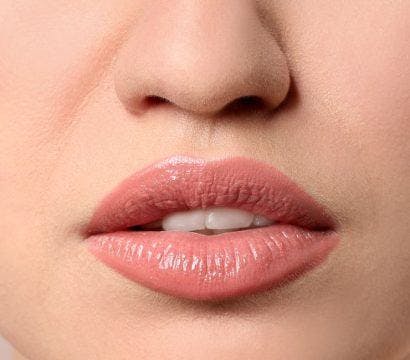Maintaining strong teeth is crucial at any age, requiring a lifelong commitment to optimal oral health. Discover how to strengthen teeth at any life stage so you can keep your grin radiant today up until your golden years. Follow these tips for your healthiest smile yet!
7 ways to make your teeth stronger
Begin by laying a strong foundation for your oral health. Follow these expert recommendations:
1. Brush and floss regularly.
Alarming news from Australia’s Oral Health Tracker (2024) reveals that nearly 50% of adults don’t brush their teeth twice daily. Avoid being part of this statistic to keep your oral (and overall) health in stellar shape. Make it a habit to brush in the morning and right before bed.
“Adults should use only a pea-sized amount of toothpaste. Young children under 6 years of age should use a smear of toothpaste only,” advises the Australian Dental Association (ADA). And don’t forget to floss daily: “Clean between your teeth daily with floss or other oral hygiene aides such as interdental brushes or flossettes.”
2. Treat misaligned teeth.
If you’ve been delaying treatment for your crooked teeth, here’s another reason to visit your dentist and say yes to transforming your smile: Misaligned teeth are weaker teeth. Because cleaning through the tight spaces of an overcrowded set is challenging, bacteria in your mouth can accumulate and lead to tooth decay.
Protect your smile by addressing teeth misalignments with clear aligners. Ask your dentist about ClearCorrect, a subtle and comfortable solution to your dental woes. These aligners feature a high, flat, unscalloped trimline and a tri-layer ClearQuartz material composed of resilient polymers and an elastomeric centre. This design offers comfort while applying the force needed to push teeth in place. Achieving strong and healthy teeth is easier with this approach!
Find out if you’re a candidate for ClearCorrect aligners by taking this online smile assessment.
3. Eat teeth-friendly foods.
Consume more dairy products. Cheese is a “superfood for teeth” because of its “ability to combat acid erosion,” according to the Australian Society of Orthodontics (ASO). If dairy isn’t for you, get your calcium from soy products. Also, include high-fibre fruits and vegetables in your diet; they help scrub your teeth and stimulate saliva production through extra chewing.
In addition, make sure you’re getting enough vitamin D, which helps the body absorb calcium. A recent study by the National Institutes of Health reveals that “one in four Australian adults is vitamin D-deficient.” Boost your intake with oily fish like salmon, sardines, and mackerel.
4. Limit acidic foods.
Avoid squeezing lemon on your grilled fish to keep your teeth strong. Steer clear of tomato products, fruit juices, and carbonated beverages as well. These acidic foods can erode tooth enamel, making teeth more susceptible to plaque, cavities, and infections. The ADA also notes that tooth erosion can alter the appearance of your teeth.
5. Drink more water.
H2O should always be your beverage of choice. Drinking water after meals helps flush out food debris and bacteria from your teeth and gums. A study by the Community Dentistry and Oral Epidemiology points out that the more water you drink, the more opportunities you have for remineralisation, the process that repairs the damage caused by acid on teeth.
6. Clean your tongue.
Don’t forget about your tongue. Besides your teeth and gums, this muscle can also harbour bacteria that lead to tooth decay, bad breath, and infections. Clean your tongue thoroughly each time you brush or consider using a tongue scraper.
7. Tackle teeth grinding.
Unaware you grind your teeth? This condition can cause dental issues, including fractures and chipped teeth, and might even lead to tooth loss. Find out the cause of your grinding and consult a doctor for the best solution.
How to maintain strong teeth for every life stage
Don’t stop there! Once your teeth are in an ideal condition, you will need to maintain them throughout your life. Here are additional tips for every life stage:
Infancy to childhood (zero to 12)

Navigating children’s oral care can leave many parents doing guesswork. When should they start brushing their teeth? What type of toothpaste should they use? Here are some ways to help lay the foundation for strong teeth in your child.
Keep your baby’s tongue clean.
Babies produce less saliva than adults, making it challenging to clean milk residue from their tongues. To do this effectively, wrap your finger with gauze or cloth and dip it in warm water. Gently open your baby’s mouth, then clean their tongue using soft, circular motions.
Establish proper brushing techniques at an early age.
According to the American Dental Association, caregivers should initiate toothbrushing for children once their teeth erupt. As they grow older, emphasise the significance of proper brushing techniques for maintaining strong teeth. Teach your child to move their toothbrush gently in circular motions to prevent enamel damage. And have them brush for at least two minutes so they get through hard-to-reach areas.
Choose a fluoride toothpaste.
When it comes to strengthening your child’s teeth, the choice of toothpaste can make a difference. You can go for those that come in fun flavours to make brushing an enjoyable experience for your kids. However, ensure that the toothpaste you choose contains fluoride – an essential element in fighting tooth decay. Plus, always opt for a sugar-free variety for maximum protection.
Adolescence (13 to 17)

The teenage years, filled with sports training and evolving food preferences, introduce new challenges for dental care. By this stage, teenagers should have already established a comprehensive oral hygiene routine. If not, it’s never too late to start! Follow these tips to get on track.
Treat flossing as important as brushing.
Brushing alone? Research shows it’s not enough. The Australian Dental Association reveals a concerning statistic – out of the 80% of Australians who brush their teeth twice daily, only 25% incorporate flossing into their routine. Unfortunately, neglecting to clean the spaces between teeth can leave behind food particles, increasing the risk of gum disease or tooth decay.
Limit your intake of sweets and sodas.
Teens might want to grab soda or sweetened juices between classes or training sessions. However, these sugar-laden beverages can dim the brilliance of their smiles. To help strengthen their teeth, start by cleaning up the kitchen pantry.
Stock up on teeth-friendly foods that hydrate and clean the mouth, including crunchy fruits and vegetables. If the urge to snack (especially sweets!) is irresistible, encourage them to rinse their mouth with water to neutralise teeth-eroding acids.
Avoid unhealthy habits.
“Smoking, drinking, poor diet, sports drinks, and oral piercings all affect dental health,” reminds the Australian Dental Association. Many teens adopt these unhealthy habits for various reasons, like peer pressure and seeking an easy escape. Take the time to discuss the effects of these habits on their health and provide tips to redirect their energy towards more fulfilling and healthy activities.
Adulthood (18 onwards)

At this life stage, most people find themselves juggling multiple responsibilities – balancing jobs, family, and a social life may leave little room for dental health. However, the wear and tear on your teeth over the years, coupled with lifestyle changes, can take a toll. If left unchecked, oral problems can lead to more severe conditions. So, always prioritise making time to care for your smile.
See your dentist regularly.
Whether you’re 24 or 64, scheduling regular visits to your dentist is essential. Staying on top of your oral health is crucial because overlooked dental conditions can worsen with age.
For instance, dismissing tooth sensitivity as harmless may be a mistake as it could signal weak teeth. In this case, only your dentist can provide a definitive diagnosis after a thorough assessment. They can identify what’s thinning your enamel and prescribe measures to repair and strengthen your teeth.
Treat stomach issues
Dealing with persistent heartburn and reflux? That acid can enter your mouth and erode your tooth enamel. Consult your doctor to address any stomach issues immediately.
Don’t resort to DIY home treatments.
It might be tempting to address a dental issue and save time by resorting to home remedies. But self-treatment can potentially do more harm than good for your smile.
Take concocting a whitening toothpaste with baking soda or hydrogen peroxide, for example. Sounds easy and promising, right? However, directly applying or using high concentrations of these substances may irritate your gums and cause tooth sensitivity. Another problem on top of another!
Whether you’re a carefree teenager or a busy young adult, understanding how to strengthen teeth is crucial. Take proactive measures now to achieve optimal oral health and enjoy a lifetime of smiling confidently.
References:
Dental erosion. (n.d.). American Dental Association.
Fluoride – Australian Dental Association. (n.d.). Teeth.org.au.
Longridge, N., & Youngson, C. C. (2019). Dental Pain: Dentine Sensitivity, Hypersensitivity and Cracked Tooth Syndrome. Primary Dental Journal, 8(1), 44–51.
McLaren, L., Patterson, S., Thawer, S., Faris, P., McNeil, D., Potestio, M. L., & Shwart, L. (2016). Measuring the short‐term impact of fluoridation cessation on dental caries in Grade 2 children using tooth surface indices. Community Dentistry and Oral Epidemiology, 44(3), 274–282.
Neel, E. a. A., Aljabo, A., Strange, A., Ibrahim, S., Coathup, M., Young, A., Bozec, L., & Mudera, V. (2016). Demineralization-remineralization dynamics in teeth and bone. International Journal of Nanomedicine, Volume 11, 4743–4763.
Toothbrushes. (n.d.-b). American Dental Association.
Villazon, L. (n.d.). How hard is tooth enamel compared to other materials? BBC Science Focus Magazine.
Wilmers, J., & Bargmann, S. (2020). Nature’s design solutions in dental enamel: Uniting high strength and extreme damage resistance. Acta Biomaterialia, 107, 1–24.



